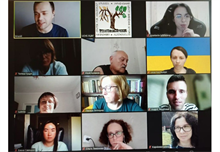"How to talk about the Holocaust after February 24?" working group. First meetings.
 We held the first meetings of “How to talk about the Holocaust after February 24?” working group. The participants began preparation of the recommendations for colleagues concerning teaching the Holocaust in the context of ongoing war. The work takes place in groups, joint debates, discussions, and notes on an interactive board. This work is crucial for everybody who has taken part in first meeting, both for their own professional and personal development and sometimes emotional relief, as well as to create a useful advisor for colleagues.
We held the first meetings of “How to talk about the Holocaust after February 24?” working group. The participants began preparation of the recommendations for colleagues concerning teaching the Holocaust in the context of ongoing war. The work takes place in groups, joint debates, discussions, and notes on an interactive board. This work is crucial for everybody who has taken part in first meeting, both for their own professional and personal development and sometimes emotional relief, as well as to create a useful advisor for colleagues.
Interesting speakers and intense, productive meetings are ahead for the entire summer.
And here are the opinions of the participants, why it is important for them to take part in the working group:
 “I want to get professional advice and effective tools on how to talk about the Holocaust tragedy against the background of the manifestations of Russian genocide against the Ukrainian people”.
“I want to get professional advice and effective tools on how to talk about the Holocaust tragedy against the background of the manifestations of Russian genocide against the Ukrainian people”.
 “It is very important for me to share our experience in a friendly expert environment and try to help others with concrete advice"
“It is very important for me to share our experience in a friendly expert environment and try to help others with concrete advice"
 “Thanks to you, I can get new knowledge, which is always accessible and easy. And I can also get an answer to the question: "How to talk about the war after 24.02.2022”
“Thanks to you, I can get new knowledge, which is always accessible and easy. And I can also get an answer to the question: "How to talk about the war after 24.02.2022”
 “It is important for me to answer the question: “How to talk about the war and draw parallels (if possible) with the Holocaust and the war in Ukraine?”
“It is important for me to answer the question: “How to talk about the war and draw parallels (if possible) with the Holocaust and the war in Ukraine?”
 “For me, it is important to find an answer to the question: “How to work with children who have traumatic experiences that arose in the conditions of war?” and how to teach the tragic pages of history without traumatizing them again”
“For me, it is important to find an answer to the question: “How to work with children who have traumatic experiences that arose in the conditions of war?” and how to teach the tragic pages of history without traumatizing them again”
 “As a scholar-historian, I am interested in everything related to the Second World War and its parallels today. As a teacher I need tools and means with the help of which I can convey this knowledge to children”
“As a scholar-historian, I am interested in everything related to the Second World War and its parallels today. As a teacher I need tools and means with the help of which I can convey this knowledge to children”
 “The events of the Russian-Ukrainian war will undoubtedly affect the teaching of history, in particular, the history of the Second World War and the Holocaust. I want to help myself and my fellow teachers navigate new realities, develop effective mechanisms and work tools"
“The events of the Russian-Ukrainian war will undoubtedly affect the teaching of history, in particular, the history of the Second World War and the Holocaust. I want to help myself and my fellow teachers navigate new realities, develop effective mechanisms and work tools"
Announcements
MoreLatest News
-
The banality of evil: from Auschwitz to Mariupol
The YouTube channel "10 Questions to a Historian" featured an interview about the history of the Auschwitz death camp, which has become an undisputed symbol of Nazi crimes in World War II. This is the story of how some people (including educated and seemingly mentally healthy people) killed other people on a scale and systematic basis that had never been seen before. The "banality of evil" was that the virtue of loyalty turned bureaucrats into committed genocide performers.
[More] -
Threats of totalitarianism today. Public lecture
On 2 April 2024, a public lecture by historian Anatolii Podolskyi, Head of the UCHS, was held at the Kyiv Cooperative Institute of Business and Law. Threats of totalitarianism today. Comparison of the Nazi crimes and modern russian ideology in the war against Ukraine was the topic.
[More] -
Recommendations for the preparation of student competition works
Dear colleagues and participants of the XXIV Medvinsky All-Ukrainian Student Competition "History and Lessons of the Holocaust"! The UCHS team has prepared recommendations and useful tips for the preparation of competition entries in one post for your convenience.
[More] -
Kovel: the Life and Death of the Jewish Community
Kovel: the Life and Death of the Jewish Community/ Petro Dolhanov. — Kyiv : Ukrainian Center for Holocaust Studies, 2023. — 101 p.
[More] -
Bulletin «Lessons of the Holocaust», № 1 (77), 2024
Dear colleagues! The fresh issue of information-pedagogical bulletin of UCHS «Lessons of the Holocaust», № 1 (77), January-March, 2024 has been published.
[More]




